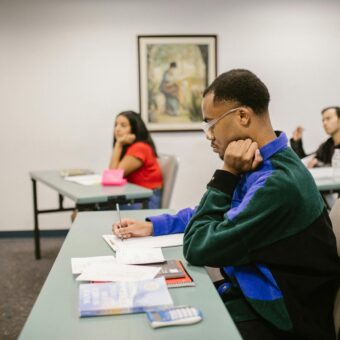
Tuition Fees
At FSB, our programs are facilitated under franchise agreements with partner universities approved by the Office for Students (OfS), ensuring our students are eligible for student finance from the Student Loans Company (SLC).
Course-Specific Fees: Tuition fees at FSB vary by course. For accurate fee information, please refer to the detailed pages of each course on our website, which outline the costs comprehensively.
Funding and Financial Support
Understanding the financial commitment of higher education is crucial, and FSB is here to guide you through the funding process:
Student Loans
Eligible students can apply for loans covering the full cost of tuition fees, as well as maintenance loans for living expenses. Eligibility typically includes UK nationals or individuals with ‘settled status’ or EU nationals with pre-settled status under certain conditions.
Maintenance Support
Beyond tuition, maintenance loans are designed to help with living costs, with amounts varying based on your living situation during your studies.
Additional Grants
Students might qualify for extra financial aid like grants for disabilities or low-income backgrounds. Use tools like the Student Finance Calculator to estimate your potential support.
Application Process
Apply for student finance via Student Finance England or relevant national bodies if you’re in Scotland, Wales, or Northern Ireland. Keeping your financial details updated is vital for ongoing support.
Fees
BA (Hons) Business Management with Foundation Year - Bath Spa University
Fees applicable until July 2025 £9,250 (per year)
Fees applicable from August 2025
Level 3 (Foundation year) : £5,760
Level 4-5-6 (per year) : £9,535
BSc (Hons) Health and Social Care Managhement with Foundation Year - Bath Spa University
Fees applicable until July 2025 £9,250 (per year)
Fees applicable from August 2025 £9,535 (per year)
BSc (Hons) Business Management with Foundation Year - Ravensbourne University London
Fees applicable until July 2025 £9,250 (per year)
Fees applicable from August 2025
Level 3 (Foundation year) : £5,760
Level 4-5-6 (per year) : £9,535
BSc (Hons) Digital Marketing with Foundation Year - Ravensbourne University London
Fees applicable until July 2025 £9,250 (per year)
Fees applicable from August 2025
Level 3 (Foundation year) : £5,760
Level 4-5-6 (per year) : £9,535
BSc (Hons) Business Management with Foundation Year - Birmingham Newman University
Fees applicable until July 2025 £9,250 (per year)
Fees applicable from August 2025
Level 3 (Foundation year) : £5,760
Level 4-5-6 (per year) : £9,535
BA (Hons) Criminology with Foundation Year - Birmingham Newman University
Fees applicable until July 2025 £9,250 (per year)
Fees applicable from August 2025
Level 3 (Foundation year) : £5,760
Level 4-5-6 (per year) : £9,535
BA (Hons) Counselling, Mental Health and Wellbeing with Foundation Year - Birmingham Newman University
Fees applicable until July 2025 £9,250 (per year)
Fees applicable from August 2025 £9,535 (per year)
MSc Digital Marketing - Ravensbourne University London
£9,250 (per year)
MA Business Management - Bath Spa University
£8,595 (per year)
MBA Leadership - Bath Spa University
£10,340 (per year)

Why Choose Fairfield School of Business?
Comprehensive Support: FSB not only offers top-tier education but also ensures you have the necessary financial backing to navigate your educational journey successfully
Informing you of your Funding Opportunities
We understand that the prospect of funding is pivotal for many considering returning to education. Here at FSB, there’s a strong likelihood that financial support could be available to you, tailored to your specific circumstances. Don’t let the fear of funding deter your educational aspirations; explore our courses, understand your funding options, and take that step towards enhancing your career with FSB.
By introducing you to the funding opportunities available, we aim to make returning to education a feasible choice for everyone, ensuring that financial concerns don’t overshadow your educational ambitions. Join us in shaping your future with confidence, knowing that financial support is within reach at FSB.
You can find further information on funding opportunities at the government website through the following links:
Student Finance for Undergraduates
Contact our friendly Admissions Team to learn more
Just click on the button to email our team
